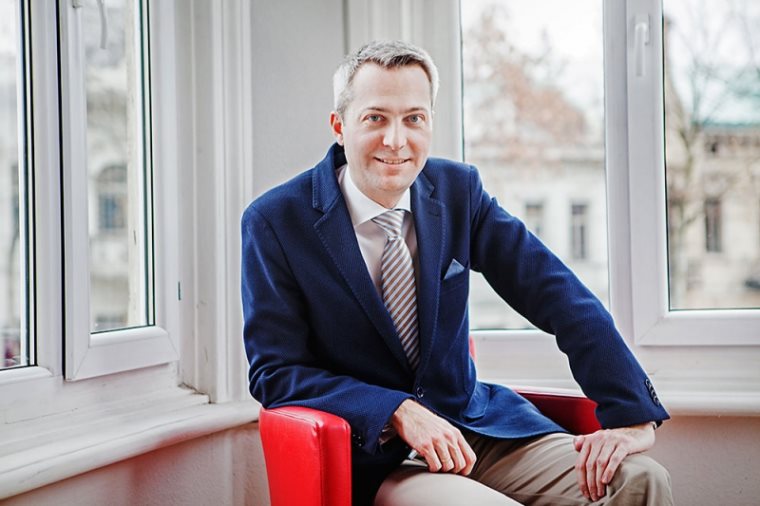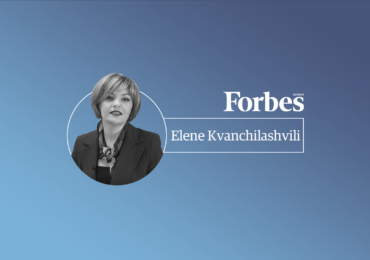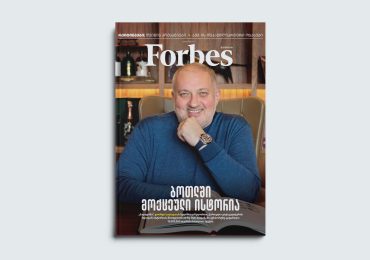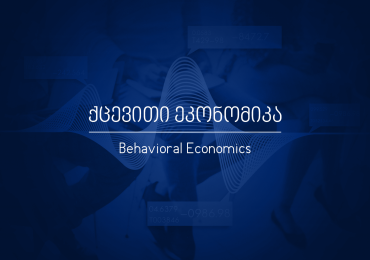One former executive of the German Technology Group is now running his own business in Georgia. Sascha Ternes is Managing Partner/Founder of Ternes Real Estate Fund, a pioneer on the local market. The German businessman has been in the service of Georgia for 20 years now.
The fact that employment is the chief driving force of an economy is a self-evident truth. According to the National Statistics Agency of Georgia, the country’s unemployment rate sits at 12.4% (though some economists suspect the actual number of people out of work is much higher). Needless to say, our guest is doing what he can to help reduce these figures. The German financier is an employer himself, and has 20 years of experience in emerging markets. Six months ago he founded his own company called Ternes Real Estate Fund. The co-founder of the company is David Shengelia who is also the Managing Director of Caparol Georgia, which is part of the German DAW Group.
“Ternes Real Estate fund is a novelty on the Georgian market,” says the owner of 60% of the company’s shares. “We are pioneers. There is no other company of its kind in Georgia,” he notes, as he goes on to provide a little insight into the new principles of stimulating the traditional real estate sector. “I have always been fascinated with the construction industry. To a certain extent, this has always been my hobby with finance being my profession. Eventually, I managed to combine these two spheres, and turned it into a great job – a real estate investment fund.”
Ternes has extensive experience in the construction and development of business-centers, both in Germany and abroad. In Georgia, Ternes played a major role in the development of ProCredit Bank’s Head Office in Tbilisi. He was also the bank’s CEO.
Mr. Ternes explains that his fund functions similar to a real estate investor, and that it’s one of the most reliable investments: “Where should we put our money? As a rule, we deposit our money in the bank, where we are not satisfied with the interest rates, or we purchase apartments and rent them out. But this does not come without problems. We take all these issues into our hands. You buy a share in a commercial property managed by Ternes Real Estate Fund, and receive high dividends from your investment. We take care of all the administrative headaches,” he says.
In addition to the above-mentioned banking deposits and apartment rent outs, investing in stocks is another well-practiced alternative on international markets. However, investing in real estate funds is the top favored choice in developed western economies. “You never know which company’s stocks will lose their value and become worthless. For instance, you might buy Volkswagen stocks, and then all of a sudden a scandal arises and your stocks aren’t worth a penny,” explains Ternes.
Ternes Real Estate Fund purchases exclusively high-end commercial property in Tbilisi. “We were considering the possibility of investing in one of Georgia’s regions, but due to the lack of high-quality commercial property there, we would have been forced to build the commercial structures ourselves. Unfortunately, there were also very few tenants who could afford to pay the high rental price for a commercial space,” explains Ternes
According to a 2014 Colliers Real Estate Market Report, 85% of Georgia’s commercial property is concentrated in Georgia’s capital Tbilisi. In fact, most ongoing residential and hotel construction is concentrated in two cities – Tbilisi and Batumi. Mr. Ternes believes that the government should balance its development programs, by investing in the regions of Georgia as well. “Institutional investors, just like my real estate fund, act in accordance with very strict criteria. German investors are moving towards the East step-by-step,” says Ternes. “Needless to say, at this stage, their efforts are mainly focused on the Baltic and Balkan regions, where the market is more profitable and predictable. For my part, I will spare no effort to turn their attention to Georgia,” he adds, stressing that the government of Georgia needs to put more effort into attracting more investors.
The former CEO of ProCredit bank, Mr. Ternes is also a the former deputy CEO of Bank of Georgia in charge of agricultural projects, and a former board member of the bank’s agricultural organization AGRONI, Ternes believes that the government’s decision to ban the sale of agricultural land to foreign nationals has had a negative impact on foreign investors, including German investors.
“The government of Georgia could have found other ways to solve this problem. In my opinion, this is more of an immigration problem rather than an agricultural problem,” says Ternes. He notes that agriculture is one of the most promising sectors in Georgia, but that the development of this sector requires access to funding, and the approach to this issue needs to be reconsidered.
“The banking sector in Georgia is developing dynamically, but the banks remain very conservative. In many cases, the problem is due to the lack of good projects and not a lack of loan access. We are currently working with the German Development Bank (KfW) to establish a new organization that will make investments in these types of projects,” he explains.
Ternes, who has spent a large part of his life in Georgia, is also involved in the activities of numerous German companies. He serves as the Chairman of the German Business Association (DWV), which was established in 2007. The DWV represents German business interests in both Georgia and Armenia. With more than 150 members, it is the second largest foreign business chamber in Georgia, and promotes German-Georgian-Armenian trade relations by providing support and services. Ternes says that so far, Georgia has failed to produce a sufficient amount of exportable goods. He says that this has led to a deficit in the country’s trade balance. Ternes explains that more attention needs to be focused on the production of goods that are in high demand on foreign markets.
“Georgia’s Deep and Comprehensive Free Trade Agreement (DCFTA) with the EU opens the door to the European market. Bringing Georgian legislation and regulations into conformity with the required standards might take a long time, but the long-term results, which require short-term investments in certain sectors, will be very impressive,” he notes.
According to the data provided by the German Business Association, there are currently 339 German companies operating in Georgia, a 13% increase from last year. The total value of goods exported from Georgia to Germany in 2014 came to €98.9 million, and the total value of goods exported from Germany to Georgia in the same year was €375.6 million. Integrating itself into the largest foreign commerce chamber network (AHK) is one of the biggest challenges ahead for the German Business Association. Despite its successful activities inside the country, the second largest chamber of commerce requires the political will in order for it to achieve this goal. Additionally, Georgia expects an even broader range of global political decisions from European leaders in terms of visa liberalization. “I hope that the positive technical report published in the first half of this year will be followed by a positive political evaluation in the second half of 2016, and Georgian citizens will no longer be required to secure visas to travel to Europe,” says Ternes.
Ternes himself did not require a visa when he first traveled to Georgia in 1996. The German Business Association did not exist at the time, but the unification of Germany, along with the contributions of the former Georgian foreign affairs minister of the Soviet Union, had already been complete. Germany’s post-Cold War development was already on a successful path. Georgia on the other hand, was still mired in the country’s dark period that set in after the collapse of the Soviet Union in the early 1990s. At the time a 20 year-old, Ternes met his future wife –the 19 year-old Tako Dondua – in Tbilisi. “I met my future wife at a friend’s house. I came to Georgia to work on an infrastructure project for a German technological company and Tako was a law student at the time. We got married and moved to Germany,” Ternes recalls. In 2007, the Ternes family moved back to Georgia. Ternes says that there were two main reasons behind their decision to move to Georgia: the country was progressing, and Ternes was offered a job in the management of the Georgian operation of ProCredit Bank.
Today Ternes and his wife Tako are the happy parents of three wonderful children. Ternes’ 4-year-old Mika and 2-year-old Monika still attend kindergarten. Their eldest son, 11 year-old Luca, attends the German International School that was founded by his father. “We bring teachers from Germany, therefore the level of education is very high and is on par with the level of education you might receive in the schools of Berlin, Munich and Frankfurt. The school also receives state funding,” he notes with pride. According to Ternes, the total number of students is 100 and 60 of the students are Georgian.
After two decades of activities on the local market Sascha Ternes ended up doing his own business in a country that has become his second homeland. German businessman invested in Georgia’s real estate market with confidence, next move is on Georgians to trustfully invest in German real estate fund.
















